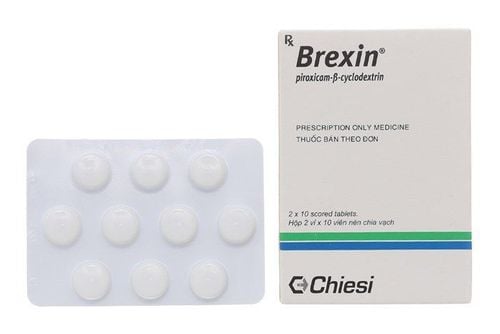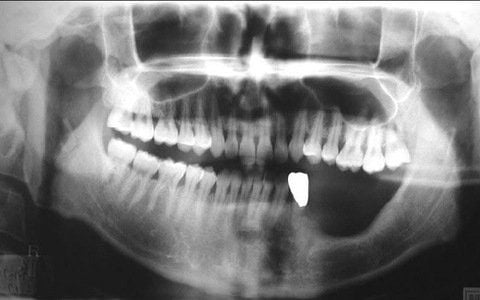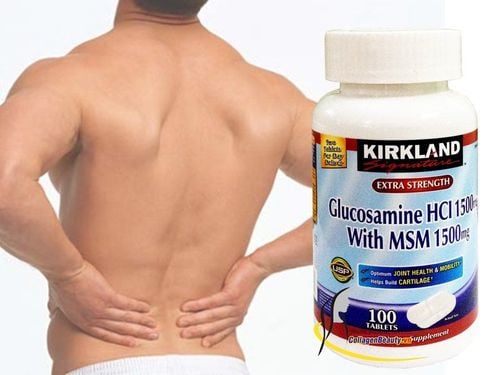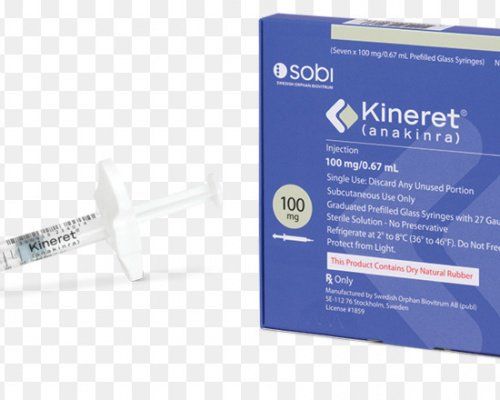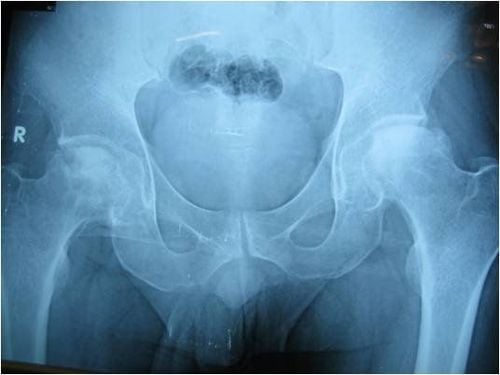This is an automatically translated article.
Hip pain is a condition that can be caused by a fall or other trauma. Severe hip pain can affect a person's ability to function, so early diagnosis and treatment will help reduce the risk of serious complications from hip pain.
1. The main causes of hip pain
In the human body, the hip joint can withstand repetitive movements and relative wear and tear. Whenever you use your hip (such as jogging), the cartilage cushioning helps prevent friction as the hip bone moves in its socket. However, with age and use, this cartilage layer can be worn or damaged, tendons and muscles in the hip must be overworked. In addition, the hip bone can be broken when you fall or experience other injuries. Any of these conditions can lead to hip pain.
Here are 8 major causes of hip pain.
1.1.Arthritis Rheumatoid arthritis and osteoarthritis are considered the most common causes of hip pain, especially in the elderly. Arthritis leads to hip inflammation and breakdown of the cartilage that cushions your hip bones. This makes hip pain worse. In addition, people with arthritis also experience stiffness and reduced range of motion in the hips.
1.2. Hip fracture With age, bones tend to become weaker and more prone to fracture than before. This risk is often increased if you have a fall or injury.
A hip fracture is a serious condition that can damage the surrounding muscles, tendons, ligaments, blood vessels and nerves. If not treated immediately, a hip fracture can greatly affect your ability to walk in the long run.
1.3. Hip bursitis Another major cause of hip pain is hip bursitis. Bursitis are fluid-filled sacs located between tissues such as bones, tendons, and muscles in the body. They work to reduce friction between these tissues when rubbing against each other.
When the bursa becomes inflamed, they can cause hip pain. This condition usually occurs because the patient has to work too hard, perform a lot of repetitive activities, or the hip joint is irritated.
1.4. Tendonitis Tendons are thick bands of tissue that attach bones to muscles. Tendonitis is a condition in which tendons become inflamed or irritated, often caused by overuse that causes repetitive stress.
Tendonitis can lead to painful symptoms in/near joints, especially around the wrists, shoulders, elbows, hips and ankles. In addition, it can also cause mild swelling or thickening of tendons near a joint.
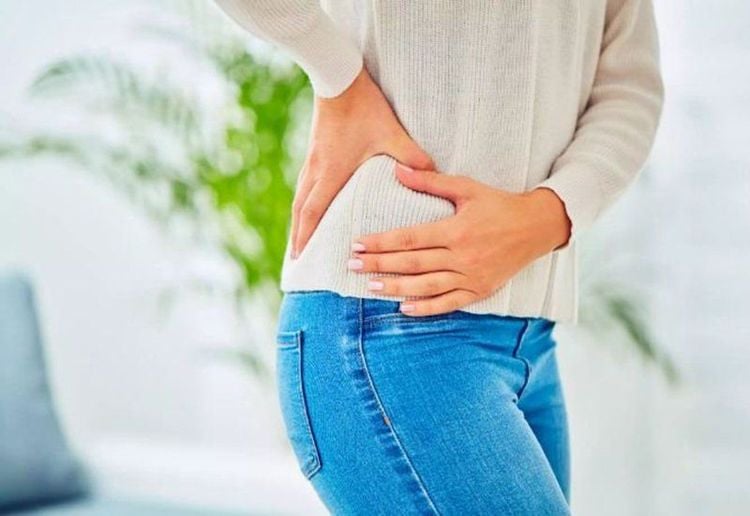
Tình trạng đau hông xảy ra có thể do nhiều nguyên nhân
1.5. Muscle strain or tendon strain Repetitive activities can strain the muscles, tendons and ligaments that support the hip. When they become inflamed due to overactivity can cause hip pain and interfere with normal hip function.
1.6.Tear of the acetabular meniscus A acetabular meniscus tear is a tear in the cartilage ring at the outer rim of the hip socket. These rings of cartilage act like a cushion to help keep the ball at the top of the thigh bone securely in the hip socket. Most athletes or those who regularly perform repetitive twisting movements will have a higher risk of developing this condition.
1.7.Cancer When cancer begins to grow in the bone or metastasize to the bone can cause pain in the hip as well as other bones of the body.
1.8.Avascular Necrosis Avascular necrosis, also known as osteonecrosis, usually occurs when blood flow to the hip bone slows and bone tissue dies. Although it can affect other bones, avascular necrosis tends to occur mainly in the hip.
Major causes of avascular necrosis, including hip fracture, dislocation, long-term use of high-dose steroids (eg, prednisone) or some other potential reason.
2. Common symptoms of hip pain
Depending on the cause of your hip pain, you may experience discomfort in the following areas:
Thighs Hips Inside the hip Outside of the hip Butt Sometimes pain can come from other areas of the hip. body, such as the groin or back (due to a hernia) spreading to the hip. Hip pain will get worse with activity, especially if the main cause is arthritis. Besides the symptoms of pain in the hip, you may also have limited or reduced range of motion. Some people's limp is caused by persistent hip pain that doesn't go away.
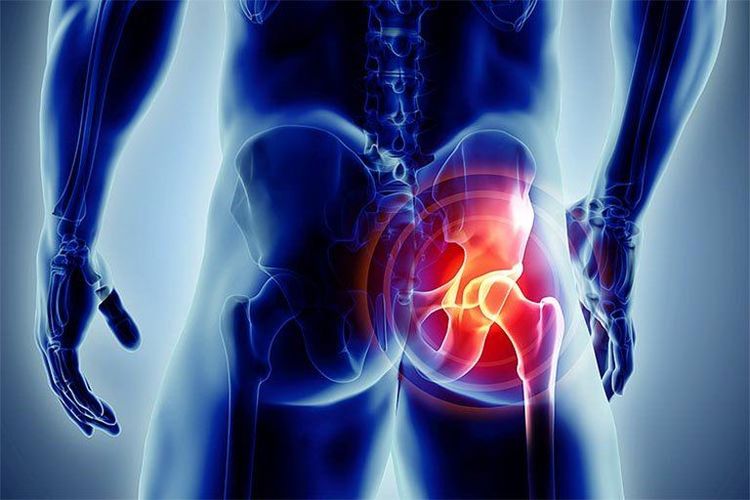
Đau xương chậu có thể khiến bạn thấy khó chịu ở hông hoặc các vùng cơ thể lân cận
3. How to relieve hip pain?
If your hip pain is caused by a tendon/muscle strain, osteoarthritis, or tendonitis, you can relieve it with over-the-counter pain relievers (such as acetaminophen), or nonsteroidal anti-inflammatory drugs (such as naproxen, ibuprofen).
Rheumatoid arthritis hip pain can be managed with the use of prescription anti-inflammatory drugs such as corticosteroids, anti-rheumatic drugs (DMARDs) such as sulfasalazine and methotrexate, or biologics that target the immune system. Translate.
Another method to help relieve hip pain is to apply ice for about 15 minutes several times a day. You should try to give the hip joint as much rest as possible until the pain is less likely to appear and is relieved. In addition, you can also take a warm bath or shower to get your body ready for stretching exercises to help relieve hip pain.
In the case of arthritis, training the hip with low-impact exercises, resistance training, and stretching can help reduce pain as well as improve joint mobility. People with arthritis should have physical therapy to help increase their range of motion.
Severe degenerative joint conditions can lead to severe hip pain or hip deformity, requiring the patient to undergo hip replacement surgery.
You need to contact your doctor immediately if the hip pain does not go away or you notice signs of redness and heat around the joint. In addition, you also need to seek early treatment if you experience hip pain at night or while resting.
Here are some signs that you need to see a doctor to get treatment for hip pain as soon as possible:
Hip pain that comes on suddenly A fall or other injury causing hip pain Deformed joint or Bleeding Hear a clicking sound in the joint when injured Severe hip pain Unable to bear any weight on hip Unable to move hip or leg Vinmec International General Hospital is one of the hospitals not only ensure professional quality with a team of leading medical doctors, a system of modern equipment and technology, but also stand out with comprehensive and professional medical examination, consultation and treatment services; civilized, polite, safe and sterile medical examination and treatment space.
Please dial HOTLINE for more information or register for an appointment HERE. Download MyVinmec app to make appointments faster and to manage your bookings easily.
Reference source: webmd.com




